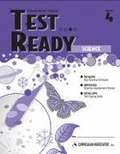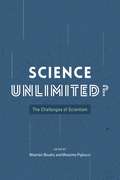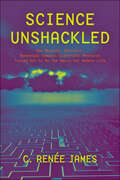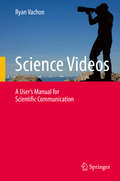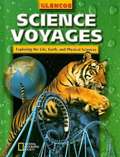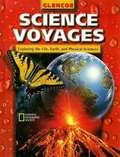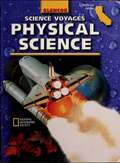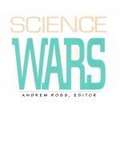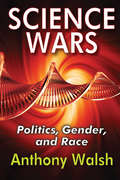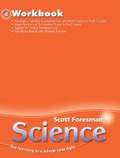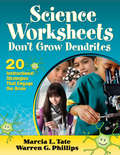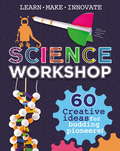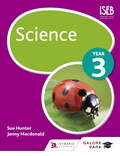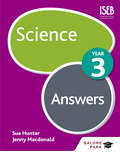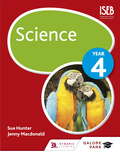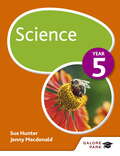- Table View
- List View
Science Term-1 Volume-3 class 7 - Tamil Nadu Board
by Government Of Tamil NaduTextbook of Science for the students of standard 7 of Tamil Nadu Board.
Science Test Ready Book 4
by Curriculum Associates StaffTEST READY Science is a review program that provides practice in test-taking skills. The program can be completed in twenty-two days or fewer. Your teacher will provide you with directions about how to do the lessons and how to record the answers. Your teacher will also tell you when to begin work on each lesson part and when to stop.
Science Unlimited?: The Challenges of Scientism
by Massimo Pigliucci Maarten BoudryAll too often in contemporary discourse, we hear about science overstepping its proper limits—about its brazenness, arrogance, and intellectual imperialism. The problem, critics say, is scientism: the privileging of science over all other ways of knowing. Science, they warn, cannot do or explain everything, no matter what some enthusiasts believe. In Science Unlimited?, noted philosophers of science Maarten Boudry and Massimo Pigliucci gather a diverse group of scientists, science communicators, and philosophers of science to explore the limits of science and this alleged threat of scientism. In this wide-ranging collection, contributors ask whether the term scientism in fact (or in belief) captures an interesting and important intellectual stance, and whether it is something that should alarm us. Is scientism a well-developed position about the superiority of science over all other modes of human inquiry? Or is it more a form of excessive confidence, an uncritical attitude of glowing admiration? What, if any, are its dangers? Are fears that science will marginalize the humanities and eradicate the human subject—that it will explain away emotion, free will, consciousness, and the mystery of existence—justified? Does science need to be reined in before it drives out all other disciplines and ways of knowing? Both rigorous and balanced, Science Unlimited? interrogates our use of a term that is now all but ubiquitous in a wide variety of contexts and debates. Bringing together scientists and philosophers, both friends and foes of scientism, it is a conversation long overdue.
Science Unshackled: How Obscure, Abstract, Seemingly Useless Scientific Research Turned Out to Be the Basis for Modern Life
by C. Rene JamesAn “entertaining, informative, and thought-provoking” look at the world of pure science and how obscure research leads to major changes in our world (John M. Henshaw, University of Tulsa, author of A Tour of the Senses).With a novelistic style, C. Renée James reveals how obscure studies of natural phenomena—including curved space-time, poisonous cone snails, exploding black holes, and the precise chemical makeup of the sun—led unexpectedly to WiFi, GPS, genetic sequencing, pain medications, and cancer treatments. Science Unshackled brings both science and scientists to life and shows how simple curiosity can result in life-changing breakthroughs.Scientists engaged in what is known as basic research never know when exploring small questions will have big impacts. But, by following the scientific method, disciplined inquiry can lead to wondrous and practical discoveries that benefit all of us in the end. The next time someone asks you why “the government” wastes its money on weird research, recall the intriguing stories James has told and tell them the answer.
Science Unshackled: How Obscure, Abstract, Seemingly Useless Scientific Research Turned Out to Be the Basis for Modern Life
by C. Renée JamesFascinating stories that describe the unlikely path from quirky idea to useful and essential knowledge.Why in the world are we paying for all this "basic" research? The answer to this question becomes clear in this romp through the "seemingly useless" world of pure science, where one thing leads to another in ways that result in major scientific advancements. With a novelistic style, C. Renée James reveals how obscure studies of natural phenomena—including curved space-time, poisonous cone snails, exploding black holes, and the precise chemical makeup of the sun—led unexpectedly to WiFi, GPS, genetic sequencing, pain medications, and cancer treatments. Science Unshackled brings both science and scientists to life and shows how simple curiosity can result in life-changing breakthroughs.Scientists engaged in basic research, funded in large part by governments around the globe and throughout the centuries, never know when exploring small questions will have big impacts. But, by following the scientific method, disciplined inquiry can lead to wondrous and practical discoveries that benefit all of us in the end. The next time someone asks you why "the government" wastes its money on weird research, recall the intriguing stories James has told and tell them the answer.
Science Videos: A User's Manual For Scientific Communication
by Ryan VachonEffective science communication is no easy task. While the effective conveyance of technical knowledge presents formidable roadblocks to sharing scientific knowledge and discoveries, certain communication tools like video and film production help to bridge this gap. This user’s manual provides a complete set of easy-to-follow directions for video-making as well as tricks of the trade to leverage these skills to better inform the intended audience.
Science Visions: Wieviel Science Fiction steckt in der Realitat?
by Gerd GanteförDie Visionen von heute können die Realität von morgen sein - die Naturwissenschaften werden auch in Zukunft die Grenzen der menschlichen Erkenntnis immer weiter hinausschieben!
Science Voyages, Level Green: Exploring the Life, Earth, and Physical Sciences
by Glencoe Mcgraw-HillScience Voyages: Exploring the Life, Earth, and Physcial Sciences (Level Red)
by Glencoe Mcgraw-HillScience textbook for high school students.
Science Voyages: Exploring the Life, Earth, and Physical Sciences (Level Blue)
by Editors at the Glencoe/ McGraw-Hill CompaniesThe book explores a variety of topics from history of science to that of physical and life sciences with interesting experiments.
Science Voyages: Level Blue-CA.Edition
by GlencoeThe Science Voyages: Level Blue – California Edition (ISBN: 9780078239915) is an 8th-grade science textbook published by Glencoe/McGraw-Hill in 2001. Designed to align with California state science standards, this comprehensive resource covers Earth, life, and physical sciences. It integrates engaging visuals, hands-on activities, and clear explanations to foster a deeper understanding of scientific concepts.
Science Voyages: Level Green (California Edition)
by Mcgraw-Hill StaffScience Life Voyages covers: interactions in the living world, the human body, ecology and life's diversity.
Science Voyages: Volume 2 (California Edition)
by Mcgraw HillHow many plants and animals are discovered each year? You might think that the answer would be a small number, or perhaps none at all, but that would not be right. Life scientists discover, describe, and name hundreds of organisms every year. How do they decide if a certain plant belongs to the iris or orchid family of flowering plants? Or, if an insect is more like a grasshopper or a beetle? Think about how scientists might make these distinctions. The science of classifying is called taxonomy (tak SAHN uh mee). Classification is an important part of your life.<P> This text starts with Chapter 21.
Science Wars
by Andrew RossIn the wake of the highly fractious Culture Wars, conservatives in science have launched a backlash against feminist, multiculturalist, and social critics in science studies. Paul Gross and Norman Levitt's book Higher Superstition, presented as a wake-up call to scientists unaware of the dangers posed by the "science-bashers," set the shrill tone of this reaction and led to the appearance of a growing number of scare stories about an "antiscience" movement in the op-ed sections of newspapers across the country. Unwilling to be political scapegoats for the decline in the public funding of science and the erosion of the public authority of scientists, many of these critics--natural scientists, sociologists, anthropologists, historians, and scholars in cultural studies and literary studies--have taken the opportunity to respond to the backlash in Science Wars.At a time when scientific knowledge is systematically whisked out of the domain of education and converted into private capital, the essays in this volume are sharply critical of the conservative defense of a value-free science. They suggest that in a world steeped in nuclear, biogenic, and chemical overdevelopment, those who are skeptical of technology are more than entitled to ask for evidence of rationality in those versions of scientific progress that respond only to the managerial needs of state, corporate, and military elites. Whether uncovering the gender-laden assumptions built into the Western scientific method, redefining the scientific claim to objectivity, showing the relationship between science's empirical worldview and that of mercantile capitalism, or showing how the powerful language of science exercises its daily cultural authority in our society, the essays in Science Wars announce their own powerful message. Analyzing the antidemocratic tendencies within science and its institutions, they insist on a more accountable relationship between scientists and the communities and environments affected by their research.Revised and expanded from a recent issue of Social Text, Science Wars will provoke thought and controversy among scholars and general readers interested in science studies and current cultural politics.Contributors. Stanley Aronowitz, Sarah Franklin, Steve Fuller, Sandra Harding, Roger Hart, N. Katherine Hayles, Ruth Hubbard, Joel Kovel, Les Levidow, George Levine, Richard Levins, Richard C. Lewontin, Michael Lynch, Emily Martin, Dorothy Nelkin, Hilary Rose, Andrew Ross, Sharon Traweek, Langdon Winner
Science Wars: Politics, Gender, and Race
by Anthony WalshFew issues cause academics to disagree more than gender and race, especially when topics are addressed in terms of biological differences. To conduct research in these areas or comment favorably on research can subject one to scorn.When these topics are addressed, they generally take the form of philosophical debates. Anthony Walsh focuses upon such debates and supporting research. He divides parties into biologists and social constructionists, arguing that biologists remain focused on laboratory work, while constructionists are acutely aware of the impact of biologists in contested territories.Science Wars introduces the ideas motivating the parties and examines social constructionism and its issues with science. He explores arguments over conceptual tools scientists love and constructionists abhor, and he provides a solid discussion of the co-evolution of genes and culture. Walsh then focuses his attention on gender, how constructionists view it, and the neuroscience explanation of gender differences. Moving to race, Walsh looks at how some have tried to bury the concept of race, while others emphasize it. He considers definitions of race—essentialist, taxonomic, population, and lineage—as they have evolved from the time of the Enlightenment to the present. And finally, he attempts to bring the opposing sides together by pointing out what each can bring to a meaningful discussion.
Science Without Laws: Model Systems, Cases, Exemplary Narratives
by Elizabeth Lunbeck M. Norton Wise Angela N. H. CreagerPhysicists regularly invoke universal laws, such as those of motion and electromagnetism, to explain events. Biological and medical scientists have no such laws. How then do they acquire a reliable body of knowledge about biological organisms and human disease? One way is by repeatedly returning to, manipulating, observing, interpreting, and reinterpreting certain subjects--such as flies, mice, worms, or microbes--or, as they are known in biology, "model systems. " Across the natural and social sciences, other disciplinary fields have developed canonical examples that have played a role comparable to that of biology's model systems, serving not only as points of reference and illustrations of general principles or values but also as sites of continued investigation and reinterpretation. The essays in this collection assess the scope and function of model objects in domains as diverse as biology, geology, and history, attending to differences between fields as well as to epistemological commonalities. Contributors examine the role of the fruit fly Drosophila and nematode worms in biology, troops of baboons in primatology, box and digital simulations of the movement of the earth's crust in geology, and meteorological models in climatology. They analyze the intensive study of the prisoner's dilemma in game theory, ritual in anthropology, the individual case in psychoanalytic research, and Athenian democracy in political theory. The contributors illuminate the processes through which particular organisms, cases, materials, or narratives become foundational to their fields, and they examine how these foundational exemplars--from the fruit fly to Freud's Dora--shape the knowledge produced within their disciplines. Contributors Rachel A. Ankeny Angela N. H. Creager Amy Dahan Dalmedico John Forrester Clifford Geertz Carlo Ginzburg E. Jane Albert Hubbard Elizabeth Lunbeck Mary S. Morgan Josiah Ober Naomi Oreskes Susan Sperling Marcel Weber M. Norton Wise
Science Workbook: Grade 5
by Scott ForesmanThis Grade 5 workbook covers life science, earth science and physical science.
Science Worksheets Don't Grow Dendrites: 20 Instructional Strategies That Engage the Brain
by Marcia L. Tate Warren G. PhillipsA brain-friendly guide for motivating students to live, eat, and breathe science! The authors outline 20 proven brain-compatible strategies, rationales from experts to support their effectiveness, and more than 250 activities for incorporating them. Teachers will find concrete ways to engage students in science with visual, auditory, kinesthetic, and tactile experiences that maximize retention, including: Music, rhythm, rhyme, and rap Storytelling and humor Graphic organizers, semantic maps, and word webs Manipulatives, experiments, labs, and models Internet projects
Science Workshop: 60 Creative Ideas for Budding Pioneers
by Anna ClaybourneLearn, make and innovate with this bumper book packed with sixty projects. Science Workshop is the go-to guide for creative and unique experiments. With chapters on art, food, nature, pure science and technology, this book will have a great 'make' for you. Step-by-step instructions can help you:-Take to the skies with a plane inspired by the Wright brothers-Light up the world with a neon sign influenced by artist Tracy Emin-Construct a stunt ramp to get to grips with forces like Galileo Galilei-And much, much more! All the projects in Science Workshop are prompted by featured profiles of great scientists, artists and engineers. Learn about and create the experiments and builds that have led to world-changing discoveries, amazing machines and inspiring artworks. Perfect for KS2 science and technology classes aged 9 and up.
Science Year 3
by Jenny Macdonald Sue HunterScience Year 3 goes beyond the requirements of the new National Curriculum and builds an excellent foundation for scientificunderstanding, exploring the study of our bodies, vertebrates and invertebrates, light and shadow, materials, rocks and dinosaurs. Together with Science Year 4, this book is ideal to underpin a course of study leading to Common Entrance and other independent school entrance exams at 11+- Endorsed by ISEB- Packed with challenging exercises and practical activities to stimulate and enthuse young scientists- 'Did you know?' boxes encourage an active interest in science and the world around us- Rigorous extension questions will stretch and challenge the most able
Science Year 3 Answers
by Jenny Macdonald Sue Hunter- Clear layout saves time marking work - Enables efficient assessment of pupils' strengths and weaknesses - Includes diagrams and working where necessary, to demonstrate how to present answers
Science Year 4
by Jenny Macdonald Sue HunterScience Year 4 covers all relevant topics including habitats, plants, solids, liquids and gases, electrical circuits and friction. Rigorous exercises and scientific activities throughout are certain to challenge and engage young scientists. Together with Science Year 3, this book is ideal to underpin a course of study leading to Common Entrance and other independent school entrance exams at 11+.- Endorsed by ISEB- Packed with challenging exercises and practical activities to stimulate and enthuse young scientists- 'Did you know?' boxes encourage an active interest in science and the world around us- Rigorous extension questions will stretch and challenge the most able
Science Year 5
by Jenny Macdonald Sue HunterA stimulating and rigorous approach to Science that goes beyond the requirements of the National Curriculum for Year 5 pupils (aged 9 and above) preparing for Common Entrance and other independent entrance exams at 11+o Endorsed by ISEB to ensure full coverage of the Common Entrance 11+ syllabuso Develop key skills with clear explanations and diagramso Explore scientific concepts with lots of practical activitieso Challenge understanding with varied exercises and extension questionsGalore Park Science Year 5 Answers is available to purchase from the Galore Park website www.galorepark.co.uk
Science Year 5
by Jenny Macdonald Sue HunterExam Board: ISEBLevel: KS2Subject: ScienceFirst Teaching: September 2015First Exam: June 2017A stimulating and rigorous approach to Science that goes beyond the requirements of the National Curriculum for Year 5 pupils (aged 9 and above) preparing for Common Entrance and other independent entrance exams at 11+o Endorsed by ISEB to ensure full coverage of the Common Entrance 11+ syllabuso Develop key skills with clear explanations and diagramso Explore scientific concepts with lots of practical activitieso Challenge understanding with varied exercises and extension questionsGalore Park Science Year 5 Answers is available to purchase from the Galore Park website www.galorepark.co.uk

